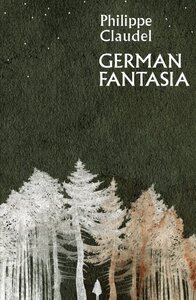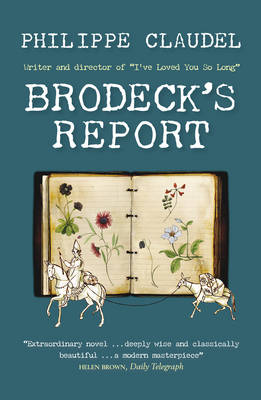Is it really so long since I read Brodeck’s Report? I haven’t read Philippe Claudel nearly enough. His latest book in English translation is a cycle of five stories set in 20th century German, exploring themes of history, memory and complicity.
The opening ‘Ein Mann’ sets the tone. It sees a German soldier abandoning his post. We don’t know his name, and the landscape through which he travels is also largely anonymous. He’s been an unthinking cog in the machinery of the Nazi regime: “Was he guilty? Guilty of having obeyed? Or guilty of not having disobeyed? All he had done was follow. Did that make him less responsible than the others?”
Now that he sees what he has participated in, he wants to get away – he’s not really thinking about where, as long as it’s somewhere else. The ending of the story suggests, however, that he can’t outrun the past.
Recurring throughout the book is the name of Viktor, who may or may not be the same character each time, but always seems to have been an active participant in atrocity. In ‘Ein Mann,’ he’s in charge of the soldier’s concentration camp. In ‘Irma Grese’, though, he’s an old man in a care home in the 1990s, albeit with a past in the regime.
Irma herself is a girl who’s been given a job in the care home, part of which is specifically to look after Viktor, who happens to be the mayor’s father. Irma resents the job, and resents the pitiful Viktor. She takes out her frustrations on him by eating his food and mistreating him other ways. In an inversion of ‘Ein Mann’, the Viktor of ‘Irma Grese’ is victim rather than oppressor now. But, as Irma will find, there are no real winners in these stories, not in the face of the cruelty that flows through the book.
Elsewhere, Claudel explores the fallibility of memory. In ‘Sex und Linden’, an 90-year-old man looks back on his adolescence, and a time when he was seduced by a beautiful woman who kept whispering another man’s name (‘Viktor’, as it happens). It all sounds a bit too good to be true, and along with the man’s happy memory is a sense that the golden past can’t be recaptured, if it was there in the first place.
‘Die Kleine’ is the story of a young Jewish girl who has been rescued from a concentration camp, and taken to start a new life in a new household. She pictures the elements of her old life wrapped up in a handkerchief, but this memory is precarious. First, she recalls the old elements in a different way each time. Later, they start to lose their vibrancy:
The handkerchief, folded and tidied away in her brain, held many things but they were things that no longer moved, the way that clothes that have lost the bodies that used to inhabit them still keep a trace of their shape and their smells, but not much. Everything the little girl kept in the handkerchief reminded her of what had happened before, and over there. But over there was gone. There was only here.
The story which I found to lay down the greatest challenge to the reader was ‘Gnadentod’ – not in the sense of ‘difficulty’ but in its degree of confrontation. In this story, Claudel imagines a version of history in which the German artist Franz Marc did not die in 1916 at Verdun, but was instead placed in an asylum and subjected to a ‘mercy killing’ (to translate the story’s title) by the Nazis in 1940 due to his mental health.
Then again, maybe that’s just the official line. In one startling sequence, Claudel has Marc’s real-life biographer defending his scholarship in the face of the story’s prevailing fiction. This is a stark experience because we’re seeing fake history being created before our eyes and paraded as the truth.
In various ways throughout German Fantasia, Claudel illustrates how history and memory can be distorted (deliberately or otherwise). He also suggests that his characters are caught in the shadow of German history, no matter where or when they are.
Published by MacLehose Press.

 My view
My view
Recent Comments